Linnea Tanner's Blog, page 3
September 17, 2025
Malve von Hassell The Price of Loyalty #HistoricalFiction #medieval #France #crusades #AdelaofBlois #WilliamtheConqueror #StephenHenrydeBlois #BlogTour #TheCoffeePotBookClub @MvonHassell @cathiedunn
I’m delighted to welcome Malve von Hassell as the featured author in The Coffee Pot Book Club Blog Tour being held between September 15th – 19th, 2025. Malve von Hassell is the author of the Historical Fiction, The Price of Loyalty: Serving Adela of Blois, published by Historium Press on August 21, 2025 (376 pages).
Below are highlights of The Price of Loyalty, Malve von Hassell’s author bio, and an excerpt from the book.
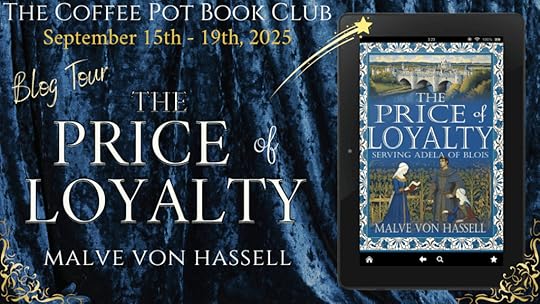
Tour Schedule Page: https://thecoffeepotbookclub.blogspot.com/2025/08/blog-tour-the-price-of-loyalty-by-malve-von-hassell.html
HIGHLIGHTS: THE PRICE OF LOYALTY
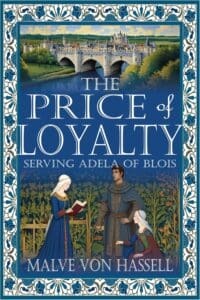
The Price of Loyalty: Serving Adela of Blois
by Malve von Hassell
Blurb:
In a time of kingdoms and crusades, one man’s heart is the battlefield.
Cerdic, a Saxon knight, serves Count Stephen-Henry of Blois with unwavering loyalty-yet his soul remains divided. Haunted by memories of England, the land of his childhood, and bound by duty to King William, the conqueror who once showed him mercy, Cerdic walks a dangerous line between past and present, longing and loyalty.
At the center of his turmoil stands Adela-daughter of a king, wife of a count, and the first to offer him friendship in a foreign land. But when a political marriage binds him to the spirited and determined Giselle, Cerdic’s world turns again. Giselle, fiercely in love with her stoic husband, follows him across sea and sand to the holy land, hoping to win the heart that still lingers elsewhere.
As the clash of empires looms and a crusade threatens to tear everything apart, Cerdic must confront the deepest truth of all-where does his loyalty lie, and whom does his heart truly belong to?
Buy Link:
Universal Buy Link: https://books2read.com/u/bpo2vg
AUTHOR BIO: MALVE VON HASSELL

Malve von Hassell is a freelance writer, researcher, and translator. She holds a Ph.D. in anthropology from the New School for Social Research. Working as an independent scholar, she published The Struggle for Eden: Community Gardens in New York City (Bergin & Garvey 2002) and Homesteading in New York City 1978-1993: The Divided Heart of Loisaida (Bergin & Garvey 1996). She has also edited her grandfather Ulrich von Hassell’s memoirs written in prison in 1944, Der Kreis schließt sich – Aufzeichnungen aus der Haft 1944 (Propylaen Verlag 1994).
Malve has taught at Queens College, Baruch College, Pace University, and Suffolk County Community College, while continuing her work as a translator and writer. She has published two children’s picture books, Tooth Fairy (Amazon KDP 2012 / 2020), and Turtle Crossing (Amazon KDP 2023), and her translation and annotation of a German children’s classic by Tamara Ramsay, Rennefarre: Dott’s Wonderful Travels and Adventures (Two Harbors Press, 2012).
The Falconer’s Apprentice (namelos, 2015 / KDP 2024) was her first historical fiction novel for young adults. She has published Alina: A Song for the Telling (BHC Press, 2020), set in Jerusalem in the time of the crusades, and The Amber Crane (Odyssey Books, 2021), set in Germany in 1645 and 1945, as well as a biographical work about a woman coming of age in Nazi Germany, Tapestry of My Mother’s Life: Stories, Fragments, and Silences (Next Chapter Publishing, 2021), also available in German, Bildteppich Eines Lebens: Erzählungen Meiner Mutter, Fragmente Und Schweigen (Next Chapter Publishing, 2022).
Her latest publication is the historical fiction novel, The Price of Loyalty: Serving Adela of Blois (Historium Press, 2025).
Author Links:
Website Twitter / X Facebook Instagram Bluesky
Book Bub Amazon Author Page Goodreads
EXCERPT: THE PRICE OF LOYALTY
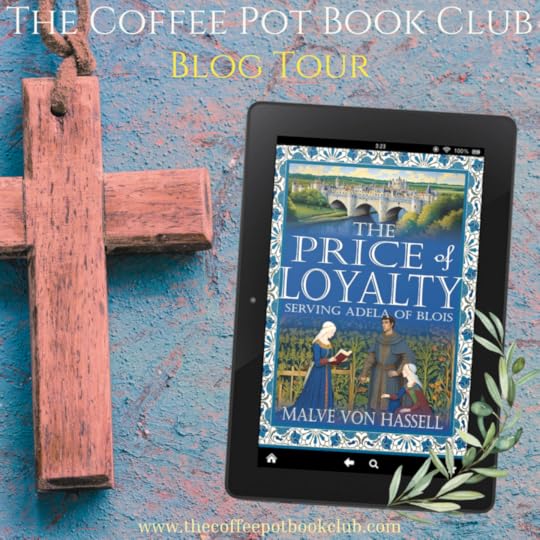
The Art Of Hunting With Birds Of Prey
And in September, O what keen delight!
Falcons and astors; merlins, sparrow hawks;
Decoy birds that shall lure your game in flocks;
And hounds with bells; and gauntlets stout and tight.
Folgore da San Geminiano (12th century)
Usually, Adela loved September.
During harvest season, the air was rich with the scent of ripened apples. Other fruits were swelling on the trees. Her favorite were the fragrant golden green pears. She didn’t care for the drink that the monks made from pears called poiré, but stewed pears were wonderful. Best of all was eating the pears fresh so that the sweet juice would run down her chin. From the window in the room where they had their lessons, she could see carters trundle oak barrels through the town on their way to the cider mills. The sight of the well-worn oak encased in bands of iron made her think of the dense, pungent odor of wet leaves in the forest during a hunt.
When the sisters allowed the girls to walk into the town on market days, they would marvel at the stalls overflowing with apples—red, golden, even green. At the abbey, some Benedictine monks, mostly occupied with brewing ale, worked on fermenting apple cider. The nuns complained that the monks spent too much time experimenting, using different types of barrels and extending the time of fermentation. Then, when they were finished, they tried out the fruits of their labor and would get drunk. The nuns locked the girls away during those days. Adela had to pinch herself from laughing at them. She had watched them sing and sway with abandon in the cloister hallway, their habits slipping and smelling strongly of spilled cider. Evidently, they enjoyed it as much as the monks did.
September meant crisp mornings and clear days warmed by the sun. On days when she was not at the abbey and her father was at home in Caen, he allowed her to come along on hunts. Her father showed her how to fly her merlin. While everyone in the castle feared his harsh, grating voice when he lost his temper—and this happened frequently—he never once raised his voice when teaching Adela during a hunt. He was always patient when showing her how to handle her bird, when to remove the hood, and how to use the lure.
“Why can’t I fly a falcon?” Adela asked, enviously eying the peregrine falcon her father was training for Henry. She liked the bird’s nearly white throat above the mottled black and white belly and its stark yellow-ringed eyes. Her kestrel looked less dramatic, with its soft golden-brown plumage with black spots and black-tipped tail; she had named it Doucette for her best friend at school.
“Children fly kestrels,” her father responded. “Falcons are for kings and emperors. When you are a lady, you can fly a merlin. That’s the order of the world. You should know this by now. Repeat the list for me.”
“How often do I have to do this?” Adela protested.
“Until you remember.”
 Twitter: @cathiedunn
Twitter: @cathiedunn
Instagram & Threads: @thecoffeepotbookclub
Bluesky: @cathiedunn.bsky.social
September 11, 2025
Catherine Kullmann Lord Frederick’s Return #Regency #HistoricalFiction #HistoricalRomance #BlogTour #TheCoffeePotBookClub @CKullmmannauthor @cathiedunn
I’m delighted to welcome Catherine Kullmann as the featured author in The Coffee Pot Book Club Blog Tour being held between August 22nd – September 12th, 2025. Catherine Kullmann is the author of the Regency Romance, Lord Frederick’s Return, published by Willow Books on 22nd July 2025 (269 pages).
Below are highlights of Lord Frederick’s Return, Catherine Kullmann’s author bio, and a guest post on how to do historical research for a book.

Tour Schedule Page: https://thecoffeepotbookclub.blogspot.com/2025/08/blog-tour-lord-fredericks-return-by-catherine-kullmann.html
HIGHLIGHTS: LORD FREDERICK’S RETURN

Lord Frederick’s Return
By Catherine Kullmann
Blurb:
An older hero, an enigmatic heroine and a delightfully outspoken four-year-old. Throw scandal into the mix for a gripping and tender Regency love story
August 1816. Lord Frederick Danlow returns to England after spending 18 years in India. He plans to make a home for himself and his motherless, four-year-old daughter, Ruperta. Unsure where to start, he accepts an invitation to stay at Ponsonby Place, home of Colonel Jack Ponsonby who made his fortune in India, and his daughter Susannah, the mistress of the household.
Soon Frederick finds himself in need of a governess—and a wife? The more time he spends with Susannah, the more his admiration of her deepens. Is she the woman with whom he will share his life?
He is resolved to court her, but then his younger brother Henry engulfs his family in an appalling scandal that could prevent any lady from agreeing to a connection with it. Now Frederick must support his family during this ordeal.
But what of Susannah? What will she say when she hears of the scandal? Should he, dare he offer her his heart and his hand?
Buy Link:
Universal Buy Link: https://mybook.to/Frederick
AUTHOR BIO: CATHERINE KULLMANN

Catherine Kullmann was born and educated in Dublin. Following a three-year courtship conducted mostly by letter, she moved to Germany where she lived for twenty-five years before returning to Ireland. She has worked in the Irish and New Zealand public services and in the private sector. Widowed, she has three adult sons and two grandchildren.
She has always been interested in the extended Regency period, a time when the foundations of our modern world were laid. She loves writing and is particularly interested in what happens after the first happy end—how life goes on for the protagonists and sometimes catches up with them. Her books are set against a background of the offstage, Napoleonic wars and consider in particular the situation of women trapped in a patriarchal society.
She is the author of The Murmur of Masks, Perception & Illusion, A Suggestion of Scandal, The Duke’s Regret, The Potential for Love, A Comfortable Alliance, Lady Loring’s Dilemma, and The Husband Criteria.
She also blogs about historical facts and trivia related to this era. You can find out more about Catherine’s books and read the blog (My Scrap Album) at her website where you can also subscribe to her newsletter.
Author Links:
Website: http://www.catherinekullmann.com/
Twitter / X: https://twitter.com/CKullmannAuthor
Facebook: https://www.facebook.com/catherinekullmannauthor
Book Bub: https://www.bookbub.com/profile/catherine-kullmann
Amazon Author Page: viewauthor.at/ckullmannamazonpage
Goodreads: https://www.goodreads.com/author/show/15549457.Catherine_Kullmann
GUEST BLOG BY CATHERINE KULLMANN

Several Bloggers on this tour have asked me to write about research for my novel and, to avoid repeating myself, I have decided to write here about historical research in general. Why is research so essential?
Good historical fiction provides insights into yesterday and helps us understand today. It can reveal past, hidden wrongs, teach us to value the struggles of those who went before us and inspire us to preserve and build upon their achievements. It can encourage us to persevere or warn us to change direction. But whatever it is that readers seek, the onus is on us, the authors, to facilitate their transition to that other time and place. To do this, we must be able to step into that other, long-ago world as easily as we step out of our own front door. Yesterday must be as real to us as today is to authors whose books are set now. But, unlike them, we have special homework to do before we start.
A Word of Warning to the novice writer.! Presumably you have decided to set your book in a particular era because it interests you. You already know something about it. BUT UNLESS YOU ARE A HISTORIAN, WHEN YOU START, ASSUME YOU KNOW NOTHING. Check Everything. It is both easy and dangerous to draw on superficial knowledge or to project back in time.
What we know now may not have been known then. We must try and look at the past through contemporaneous eyes. Here are some general questions we need to ask. I have deliberately framed them as broadly and neutrally as possible so that they can be applied to any place and any time, even to a fantasy world. With this information, you string the loom on which you will weave your story.
What Sort of Society was It?
What is the basic social unit?
Is it matriarchal, patriarchal or other?
Who are the rulers?
Is it a democracy, monarchy, oligarchy, or tribal society?
Who are the haves and have-nots?
How was justice administered?
How developed were agriculture, manufacturing and trade?
What was Happening at the Time?
What were the big issues of the day?
Who were the heroes?
Who were the enemies?
What were the scandals?
What was new in Art, Music, Architecture, Literature, Industry, Agriculture?
Next you must create a PUBLIC TIMELINE for the year(s) in which your story is set. By this, I mean the important political, cultural and social events. Here is part of one I drew up for 1816.
February 1st Opening of ParliamentFebruary 7th Lord Byron’s The Siege of Corinth and Parsinia are published togetherFebruary 15th Alastor, or, The Spirit of Solitude by Percy Bysshe Shelley is published sometime in mid-FebruaryFebruary 17th A pistol shot is fired at Miss Kelly from the pit while she was acting in O’Keefe’s farce of “The Merry Mourners” at Drury Lane theatre. The shot was fired by a Mr Barnet who, when taken into custody, proved to be a complete maniac22 Isabella; or, The Fatal Marriage” and “John of Paris.” Theatre Royal, Covent Garden.Mr Western MP writes to Creevey in Brussels. “Ruin overwhelms the farmers. I feel convinced a national bankruptcy will be the consequence………I have not any hope of midsummer rents & the generality of landowners will be minus the best part of their interest without a wonderful alterationFebruary, the Wedderburn-Websters sue the St James Chronicle for libel and are awarded £2K. (The previous August, the Chronicle reported that the husband of Lady Frances Wedderburn-Webster threatened to sue Wellington and that the Duke had offered £100K “to make up the affair”).29 February – leap yearThink of this timeline as a newspaper—this is what will occupy your characters. You weave this information through your first information set to complete your background, and perhaps find inspiration for your book. I used the incidence of a shot being fired at an actress from the pit in The Potential for Love.
Finally you need the little details that will make your story come to life. From your reading you will be able to glean information about how people lived then. You must consider:
Customs, Ethics and Mores
What were their religion and beliefs?
What behaviour was most highly valued?
How was it rewarded?
What were the worst crimes?
How were they punished?
What were the rites of passage?
Were there double standards?
What happened to people who broke the rules?
Daily Life
Where and how did they live?
What did they live on?
What knowledge did they have and how did they pass it on?
What did they eat and drink?
How did they travel?
What did they wear?
What did they value?
How did they amuse themselves?
How did they communicate?
The big question is where can you find this information? If the society is literate, start with written sources. Diaries, letters, autobiographies, novels, plays, stories, newspapers and journals are obvious sources, but don’t forget cookery books, fashion magazines, tour guides, timetables, manuals on etiquette and letter-writing, sports writing, brochures, pamphlets, advertisements, old bills, and anything else that is of your period..
What images are available for the period? Look for paintings, engravings, comic books, cartoons, daguerreotypes, photographs and film.
The further back you go in time, the more difficult it is to find primary sources but they are there, perhaps hidden in libraries or museums. And don’t forget the physical—buildings, towns and villages, battlefields, open-air museums. Be aware of your environment. Look up—in Dublin, as in many old cities, only the ground floors of buildings have been modernised and you will find the original facades over the shopfronts. Check out archaeological sites, museums, libraries, battlefields, gravestones, churches and church monuments, sculpture, furniture, and other antiques of your period. Visit old houses and estates.
If you have an enquiring mind and an eager eye you will be surprised at what you will find at flea markets, junk shops, or second-hand book shops. Museum shops are another good source and, of course, we are blessed today with the internet. So much is available online, including the full texts of old books on Gutenberg.org, for example. And if you are really stuck, you can always ask an expert. Most are very happy to help you; I wrote to the Marylebone Cricket Club at Lords when I had a question about the laws of cricket in 1814 for A Suggestion of Scandal and got a prompt and most helpful reply.
We must manage our knowledge so that we can find that elusive nugget of information at the back of our mind. We are fortunate that modern IT makes this a lot easier than the days when a card index was the height of sophistication but the bottom line is that it still comes down to sorting and filing. My research library has about 1000 books. In addition, I have a collection of over 100 prints and engravings, some framed and some not, and three folders of press cuttings and other print-outs. I have hung up most of the framed prints as useful visual reminders of how people lived. While I have not gone so far as introducing the Dewey-Decimal system, my books are shelved according to subject e.g. fashion, education, travel, the navy, gardens and herbals, magazines, diaries, memoirs and journals, etc. etc. I also have catalogued them on my PC so that I know what I have and can check quickly if I need information on a particular subject.
But, of course, I also have a lot of digital records. In my Library folder in WORD, I have a huge document called Historical Facts and Trivia where I put all my research, including anything I stumble across when looking for something else. This is broken down by subject and subheadings so it is easily searched and navigated. This is an invaluable resource; I add to it and consult it constantly. The Library folder also contains longer documents I have downloaded.
All this research feeds into my books but in a subliminal way. It enables me to walk in my character’s world and to provide the quirky embellishments that bring it to life.
© Catherine Kullmann 2025
 Twitter: @cathiedunn
Twitter: @cathiedunn
Instagram & Threads: @thecoffeepotbookclub
Bluesky: @cathiedunn.bsky.social
September 3, 2025
Book Review Daughter of Mercia Julia Ibbotson #DaughterOfMercia #JuliaIbbotson #medieval #anglosaxon #dualtime #timeslip #timetravel #mystery #romance #BlogTour #TheCoffeePotBookClub @JuliaIbbotson @cathiedunn
I’m delighted to welcome Julia Ibbotson again as the featured author in The Coffee Pot Book Club Blog Tour, being held between August 21st – September 11th, 2025. Julia Ibbotson is the author of the medieval dual-time mystery romance, Daughter of Mercia (Dr Anna Petersen Mysteries, Book #1), published by Archbury Books on June 6th, 2025 (301 pages ebook; 392 pages print).
Below are highlights of Daughter of Mercia, Julia Ibbotson ’s author bio, and my 5-star review of her gripping duel time mystery romance set in 6th Century and modern-day Britain.

Tour Schedule Page: https://thecoffeepotbookclub.blogspot.com/2025/08/blog-tour-daughter-of-mercia-by-julia-ibbotson.html
HIGHLIGHTS: DAUGHTER OF MERCIA
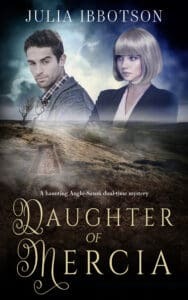
Daughter of Mercia
(Dr Anna Petersen Mysteries, Book #1)
by Julia Ibbotson
Blurb:
Echoes of the past resonate across the centuries as Dr Anna Petersen, a medievalist and runologist, is struggling with past trauma and allowing herself to trust again. When archaeologist (and Anna’s old adversary) Professor Matt Beacham unearths a 6th century seax with a mysterious runic inscription, and reluctantly approaches Anna for help, a chain of events brings the past firmly back into her present. And why does the burial site also contain two sets of bones, one 6th century and the other modern?
As the past and present intermingle alarmingly, Anna and Matt need to work together to solve the mystery of the seax runes and the seemingly impossible burial, and to discover the truth about the past. Tensions rise and sparks fly between Anna and Matt. But how is 6th century Lady Mildryth of Mercia connected to Anna? Can they both be the Daughter of Mercia?
For fans of Barbara Erskine, Elena Collins, Pamela Hartshorne, Susanna Kearsley and Christina Courtenay.
Buy Link:
Universal Buy Link: https://myBook.to/DOMercia
This title is available to read on #KindleUnlimited.
AUTHOR BIO: JULIA IBBOTSON

Julia Ibbotson is fascinated by the medieval world and the concept of time. She is the author of historical mysteries with a frisson of romance. Her books are evocative of time and place, well-researched and uplifting page-turners. Her current series focuses on early medieval time-slip/dual-time mysteries.
Julia read English at Keele University, England, specialising in medieval language / literature / history, and has a PhD in socio-linguistics. After a turbulent time in Ghana, West Africa, she became a school teacher, then a university academic and researcher. Her break as an author came soon after she joined the RNA’s New Writers’ Scheme in 2015, with a three-book deal from Lume Books for a trilogy (Drumbeats) set in Ghana in the 1960s.
She has published five other books, including A Shape on the Air, an Anglo-Saxon timeslip mystery, and its two sequels The Dragon Tree and The Rune Stone. Her latest novel is the first of a new series of Anglo-Saxon dual-time mysteries, Daughter of Mercia, where echoes of the past resonate across the centuries.
Her books will appeal to fans of Barbara Erskine, Pamela Hartshorne, Susanna Kearsley, and Christina Courtenay. Her readers say: ‘Julia’s books captured my imagination’, ‘beautiful story-telling’, ‘evocative and well-paced storylines’, ‘brilliant and fascinating’ and ‘I just couldn’t put it down’.
Author Links:
Website Twitter / X Facebook Instagram Bluesky
Pinterest Amazon Author Page Goodreads
BOOK REVIEW: DAUGHTER OF MERCIA

When archaeologist Dr Anna Petersen, a medievalist and runologist, is summoned to a dig by the lead archaeologist, Professor Matt Beacham, he reluctantly asks her to interpret the ruins engraved on a medieval Saxon sword. Of most interest are two skeletons buried together at the dig—a 6th century woman and a modern-day man. The discovery opens up Anna’s raw emotions from a previous trauma and her current inexplicable visions. The possibility of Einstein’s mind-bending bridge theory and suspense abound in the duel-time mystery romance, Daughter of Mercia (Dr Anna Petersen Mysteries, Book #1) by Julia Ibbotson, set in 6th Century and modern-day Britain.
The mystery begins in 535 AD when Lady Mildryth beholds “a huge ball of light sear the night sky, streaking across the heavens, leaving a trail of flames and smoke and stars behind it.” Though she has adopted the new Christian faith, she fears the old gods of her homeland are stirring. The story alternates between Mildryth, an unmarried Angeln female ruler facing the prospect of marrying another ruler, and the modern-day archaeologist, Anna, fighting to retain her reputation after a traumatic breakup. As the storyline unfolds, Anna and Matt struggle to fit the pieces of the puzzle about what happened at the site in conjunction with actual events Mildryth is experiencing. It is as though Mildryth is reaching out to Anna across time to help her solve the mystery of how the present archaeological findings connect to the past in a theoretical “wormhole” or “portal.”
Author Julia Ibbotson masterfully weaves the duel-time events to create a gripping suspense that keeps you turning the pages. Vivid details of the time period and archaeological techniques demonstrate the author’s meticulous research on the time period and the methods used to interrupt findings. The culture and language of ancient Saxons are captured in juxtapose to modern-day Britain. Nonetheless, the protagonists are bound together through their visions. In many ways they are similar: engaging, independent women who dare to defy their superiors. Suspense builds as Anna and Matt uncover new evidence that could possibly link the disappearance of a person to events occurring simultaneously in the past. Twists in the storyline keep you turning the pages until the unexpected ending.
Daughter of Mercia promises to be the start of a new series about an archaeologist sleuth who solves mysteries from the past. I recommend it to those who enjoy reading duel-time romance mysteries and solving paradoxes that seems to defy logic but upon closer examination may lead to deeper understanding.
 Twitter: @cathiedunn
Twitter: @cathiedunn
Instagram & Threads: @thecoffeepotbookclub
Bluesky: @cathiedunn.bsky.social
September 1, 2025
G. M. Baker The Wanderer and the Way #HistoricalFiction #MedievalFiction #SantiagoDeCompostela #BlogTour #TheCoffeePotBookClub @mbakeranalecta @cathiedunn
I’m delighted to welcome G.M. Baker again as the featured author in The Coffee Pot Book Club Blog Tour being held between August 12th – September 2nd, 2025. G.M. Baker is the author of the Historical Fiction, The Wanderer and the Way (Cuthbert’s People, Book 4), published by Stories All the Way Down on March 10th, 2025 (249 pages).
Below are highlights of The Wanderer and the Way, G.M. Baker’s author bio, and a guest post about the historical background of the novel.

Tour Schedule Page: https://thecoffeepotbookclub.blogspot.com/2025/07/blog-tour-the-wanderer-and-the-way-by-g-m-baker.html
HIGHLIGHTS: THE WANDERER AND THE WAY
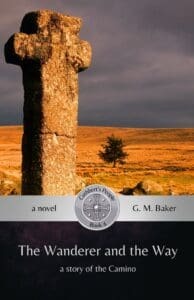
The Wanderer and the Way
(Cuthbert’s People, Book 4)
by G.M. Baker
Blurb:
The Camino de Santiago de Compostela, now the most famous pilgrimage route in the world, was founded in the early ninth century, largely due to the efforts of Bishop Theodemir of Iria Flavia. As with most people of this period, nothing seems to be known of his early years. What follows, therefore, is pure invention.
Theodemir returns footsore and disillusioned to his uncle’s villa in Iria Flavia, where he meets Agnes, his uncle’s gatekeeper, a woman of extraordinary beauty. He falls immediately in love. But Agnes has a fierce, though absent, husband; a secret past; another name, Elswyth; and a broken heart.
Witteric, Theodemir’s cruel and lascivious uncle, has his own plans for Agnes. When the king of Asturias asks Theodemir to undertake an embassy on his behalf to Charles, King of the Franks, the future Charlemagne, Theodemir plans to take Agnes with him to keep her out of Witteric’s clutches.
But though Agnes understands her danger as well as anyone, she refuses to go. And Theodemir dares not leave without her.
Any Triggers: Rape is mentioned by not portrayed.
Buy Link:
Universal Buy Link: https://books2read.com/thewandererandtheway
AUTHOR BIO: G.M. BAKER

Born in England to a teamster’s son and a coal miner’s daughter, G. M. (Mark) Baker now lives in Nova Scotia with his wife, no dogs, no horses, and no chickens. He prefers driving to flying, desert vistas to pointy trees, and quiet towns to bustling cities.
As a reader and as a writer, he does not believe in confining himself to one genre. He writes about kind abbesses and melancholy kings, about elf maidens and ship wreckers and shy falconers, about great beauties and their plain sisters, about sinners and saints and ordinary eccentrics. In his newsletter Stories All the Way Down, he discusses history, literature, the nature of story, and how not to market a novel.
Author Links:
Website Substack Twitter / X Facebook
Book Bub Amazon Author Page Goodreads
GUEST POST: HISTORICAL BACKGROUND
THE WANDERER AND THE WAY

The historical background to The Wanderer and the Way actually starts in a very distant place and with a very distant event, the great Viking raid on the holy island of Lindisfarne in AD 793. That was the event that set in motion the first novel of my Cuthbert’s People series, The Wistful and the Good, which led my main series character, Elswyth, the daughter of a minor Anglo-Saxon thegn living on the coast of Northumbria a little south of Lindisfarne, to find herself, in AD 798, the kidnapped wife of a Viking captain, living in the villa of a lascivious Visigothic lord in the Kingdom of Asturias in Northern Spain.
The late eighth century was a fascinating period with many notable events happening in close proximity. Having emerged from the chaos of the fall of Rome, a new Christian civilization was consolidating itself across Europe. The Roman and Irish churches, cut off for centuries by pagan invasions, had met and reconciled. In Britain it was the latter days of the Northumbrian renaissance, the rootstock of the Carolingian renaissance that occurred under Charlemagne. The great scholar Alcuin built a library in York and became a minister to Charlemagne. Charlemagne was consolidating Frankish control of Western Europe and would be crowned Holy Roman Emperor by the Pope in AD 800.
But Europe was also under attack from several directions. Viking raids had begun, though the Viking conquests of Britain and Normandy were still in the future. The Moors were attempting to complete their conquest of the Iberian Peninsula, the chief Christian holdout being the Visigothic Kingdom of Asturias, ruled by Alonzo the Chaste. In AD 812, Bishop Theodemir of Iria Flavia, in Asturias, would be instrumental in the discovery of the bones of St. James the Great, the patron of Spain, which would lead to the founding of the Camino de Santiago, or Way of St. James, now the most famous pilgrimage route in the world. Alonzo the Chaste was its first recorded pilgrim.
Having stranded Elswyth in Spain with no obvious way to get her home to Northumbria, I turned to a youthful Theodemir and gave him an entirely imaginary youth in which he encountered and fell in love with Elswyth, though she was living under the name Agnes at the time, having been given that name by Mother Wynflaed of Whitby in St. Agnes and the Selkie.
During this period, Alonzo the Chaste sent several embassies to Charlemagne to ask for recognition of his kingship and his help against the Moors. I could find no details of the method or composition of these embassies, so I had Alonzo choose Theodemir for his ambassador, and for his route, I sent him along what is now called the Camino Frances between Saint-Jean-Pied-de-Port and Santiago de Compostela. While it was not feasible to bring Charlemagne himself into the story, he being occupied with the conquest of the Avars at the time, I did contrive for Theodemir and Agnes to have a fruitful interview with Alcuin, then installed as the Abbot of Marmoutier Abbey in Tours.
Another element of the historical period that plays a role in the novel is the Adoptionism Controversy. Adoptionism was a Christian heresy that held that Christ acquired his divinity by adoption, rather than being eternally part of the Trinity as the orthodox position, defined at the Council of Nicaea, had taught. Ideological purity tests have long featured in the conduct of diplomacy, the making of alliances, and the provision of aid. They do so today, and they did so then. Whether one held to the orthodox trinitarian formula of Nicaea or to the Adoptionism doctrine was a vital issue in the day, and so it enters into Theodemir’s mission to Charlemagne.
These great events and issues, however, are merely the background to a much more intimate story about a young man who falls in love with a young woman and strives to save her from a grotesque fate though she herself would prefer to stand and face it in solidarity with the other women who were kidnapped with her, and also as a penance for her own crimes.
 Twitter: @cathiedunn
Twitter: @cathiedunn
Instagram & Threads: @thecoffeepotbookclub
Bluesky: @cathiedunn.bsky.social
August 31, 2025
Mike Weedall Escape To The Maroons #HistoricalFiction #AmericanHistoricalFiction #AfricanAmericanHistory #BlogTour #TheCoffeePotBookClub
I’m delighted to welcome Mike Weedall as the featured author in The Coffee Pot Book Club Blog Tour being held between September 1st – 5th, 2025. Mike Weedall is the author of the Historical Fiction, Escape To The Maroons, published by Historium Press on August 19th, 2025 (275 pages).
Below are highlights of Escape To The Maroons, Mike Weedall’s author bio, and an excerpt from the book.

Tour Schedule Page: https://thecoffeepotbookclub.blogspot.com/2025/08/blog-tour-escape-to-the-maroons-by-mike-weedall.html
HIGHLIGHTS: ESCAPE TO THE MAROONS

Escape To The Maroons
By MikeWeedall
Blurb:
In 1792, an escaped slave, raised and living as white, is discovered and forced to flee into the Great Dismal Swamp.
Barely escaping a bounty hunter, a Maroons community of fugitive slaves rescues him. Over time, Nathanial comes to accept his true identity while fighting to overcome the suspicions of his new community. Because of his pale skin, he becomes a conductor on the underground railroad, slipping runners onto ships going north. On one of his missions, fate intervenes and places Nathanial’s community at risk.
This little-known chapter in American history tells how escaped enslaved people gave their all to live free while creating a community and economy in one of the world’s most unforgiving environments.
Buy Links:
Universal Buy Links:
Ebook: https://geni.us/eRthZgH
Paperback: https://geni.us/RM5o
Hardcover: https://geni.us/AVs7
AUTHOR BIO: MIKE WEEDALL

As the author of three books, Mike’s passion is finding the little-known stories of history and bringing them to life. History in school is too often events and dates. Mike seeks to discover the people who lived those events and reveal why those individuals made the decisions they did. Ultimately, there are stories to be mined, and who doesn’t love a good story?
In his historical novel “Escape To The Maroons,” Mike tells the little-known story of 1791 self-liberated slaves who chose to struggle for survival in The Great Dismal Swamp in their determination to live free. The term Maroons delineates areas where escaped slaves fled and could not be recaptured. It’s estimated that over 2,000 survived deep in the swamp around the turn of that century.
His first book “Iva: The True Story of Tokyo Rose” describes the tragic life of Iva Toguri. Trapped in Japan during World War II, this Japanese American woman was forced to work for Radio Tokyo. Although she never participated in propaganda, the racial animus of post-war America led to her being falsely labelled as Tokyo Rose and prosecuted for treason. Through her incarceration and the ongoing discrimination heaped upon her, Iva never lost her courage and determination.
“War Angel: Korea 1950” was his second book that followed a reservist nurse thrust into the carnage of The Korean War. Serving as an operating room nurse in a Mobile Army Surgical Hospital, the real MASH and strength of a woman is revealed.
Mike resides with his family in the Pacific Northwest where they enjoy experiencing the outdoors.
Author Links:
Website: https://www.MikeWeedallAuthor.com
Facebook: https://www.facebook.com/profile.php?id=100094196717126
Book Bub: https://www.bookbub.com/profile/mike-weedall
TikTok: https://www.tiktok.com/@mike.weedall8
Amazon Author Page: https://www.amazon.com/stores/Mike-Weedall/author/B082J6MMN2
Goodreads: https://www.goodreads.com/author/show/5681426.Mike_Weedall
EXCERPT: ESCAPE TO THE MAROONS

Moses Reflecting On Saving A Fleeing Slave From A Bounty Hunter & Concern About The Safety Of Their Maroons Community
Sometimes, I don’t understand Linc. He tells us the most important thing is to avoid outside contact unless necessary for survival. When there’s no other way, only then we raid. So far, we’ve not had a problem.
It’s plain unlucky to bump into this runner today. We’re damn lucky to be alive.
Nothing good comes from dealing with whites. When the British made me a King’s Soldier in their army, they promised freedom if we helped defeat what they called a small American revolution. One day, without warning, them British got on their ships and left us with only our uniforms and guns. It was a matter of time before the Americans captured or killed us. At least I hid this gun before being taken prisoner. Thank the Lord, I had it today.
Like I said, nothing good comes from dealing with whites. This new man looks like a child with those baby cheeks and soft hands. What good is he gonna do for us?


Twitter: @cathiedunn
Instagram & Threads: @thecoffeepotbookclub
Bluesky: @cathiedunn.bsky.social
August 28, 2025
D. C. Wilkinson Scents of Lavender #HistoricalFiction #Romance #LGBTRomance #LGBTQ #IllustratedPoetry, #BlogTour #TheCoffeePotBookClub @dcwilkinson2024 @cathiedunn
It is my pleasure to welcome D. C. Wilkinson as the featured author in The Coffee Pot Book Club Blog Tour being held between August 25th – 29th, 2025. D. C. Wilkinson is the author of the Poetry / Historical Fiction / LGBTQ+ Romance, Scents of Lavender: Queer Love Through the Ages –In Verse, published by DCW Press on June 1, 2025 (108 pages).
Below are highlights of Scents of Lavender, D. C. Wilkinson’s author bio, and a snippet from the book.

Tour Schedule Page: https://thecoffeepotbookclub.blogspot.com/2025/08/blog-tour-scents-of-lavender-by-d-c-wilkinson.html
HIGHLIGHTS: SCENTS OF LAVENDER

Scents of Lavender: Queer Love Through the Ages –In Verse
by D. C. Wilkinson
Blurb:
Timeless and unwavering, love flows through a universal melody that echoes in every corner of the globe. Transcending borders and cultures, it sows the seeds of memories that sprout and blossom in Scents of Lavender, a collection of 25 illustrated poems that breathe life into evocative scenes where queer love proudly re-emerges from the depths of history, uncovering deep and everlasting bonds.
Each poem invites the reader to explore the narrator’s deeply personal and intimate perspective through pantheistic eyes. Written in the first person, every verse unfolds as both a reflection and a manifestation of a single universal mind and soul, drawing the reader into a shared understanding that love –in all its forms– is boundless, eternal, and permeates the cosmos.
Buy Link:
Universal Buy Link: https://mybook.to/Fbo5QDA
Trailer with Snippets: https://dcwilkinson.substack.com/p/scents-of-lavender-bea
AUTHOR BIO: D. C. WILKINSON

D. C. Wilkinson is an award-winning novelist, poet, and lifelong voyager of inner and outer realms. His literary work centers on his passion for historical tales, portal fantasies, and dreams and visions often weaved into narratives that highlight LGBTQ+ experiences.
He began his career in the Midwest as a student of Language Arts before relocating to the East Coast in his early twenties. A graduate of Columbia University and former New York City public school teacher, he now calls Connecticut his home, where he resides with his spouse and their beloved beagle.
Author Links:
Website Twitter / X Facebook Instagram Linkedin
Pinterest TikTok Amazon Author Page Goodreads
SNIPPET: SCENTS OF LAVENDER

Though they tried to vanquish us,
our love endures,
in the hearts of those
stirred by our flame
and undeterred by malice
and brutality.
From Hierocles
 Twitter: @cathiedunn
Twitter: @cathiedunn
Instagram & Threads: @thecoffeepotbookclub
Bluesky: @cathiedunn.bsky.social
August 19, 2025
Jane Loftus The Herb Knot #HistoricalFiction #medieval #Winchester #BlogTour #TheCoffeePotBookClub @cathiedunn
I’m delighted to welcome Jane Loftus as the featured author in The Coffee Pot Book Club Blog Tour being held between August 6th – 27th, 2025. Jane Loftus is the author of the Medieval Historical Fiction, The Herb Knot, published by HQ Digital on May 8th, 2025 (336 pages).
Below are highlights of The Herb Knot, the author bio of Jane Loftus, and an excerpt from the book.

Tour Schedule Page: https://thecoffeepotbookclub.blogspot.com/2025/07/blog-tour-the-herb-knot-by-jane-loftus.html
HIGHLIGHTS: THE HERB KNOT
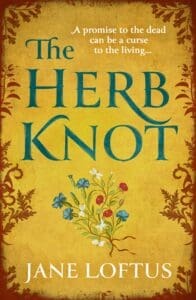
The Herb Knot
By Jane Loftus
Audiobook Narrator: Matt Addis
Blurb:
The Hundred Years’ War comes to life in this spellbinding tale of love, betrayal and conspiracy …
A quest born on the battlefield will change a young boy’s destiny…
Rafi Dubois is five years old when his mother is murdered after the Battle of Crecy in 1346. Alone and lost, Rafi is given a token by the dying Englishman who tried to save his mother’s life: a half-broken family seal which he urges Rafi to return one day to Winchester.
Years later, when Rafi saves a wealthy merchant’s wife from a brutal robbery, he is rewarded with the chance to travel to England, taking the seal with him.
But when he reaches Winchester, Rafi finds himself in a turbulent world full of long-held allegiances, secrets and treachery. His path is fraught with danger and with powerful enemies working against him, Rafi falls in love with Edith, a market apothecary. But in doing so, Rafi unleashes a deadly chain of events which threatens to overwhelm them both…
The Herb Knot is a sweeping and passionate novel set in one of the most tumultuous times in English history, from a powerful new voice.
Triggers: Domestic abuse / violence (not much, but two short depictions), implied sexual assault, attempted murder, actual murder.
Buy Link:
Universal Buy Link: https://books2read.com/u/bzN6Z2
AUTHOR BIO: JANE LOFTUS

Jane Loftus gained a degree in 16th Century European and British history from Surrey before taking a postgraduate degree in modern political history. As a lone parent, she worked in Winchester Waterstones before returning to IT once her son was older.
Hugely passionate about the Middle Ages, she drew inspiration for this novel from the medieval layout of Winchester which has been painstakingly documented.
Jane is originally from London but has lived in Winchester for over twenty years. When not writing, she is usually out walking or watching costume dramas on Netflix – the more medieval the better. She also plays far too many rpgs.
Author Links:
Website: https://janeloftus.com/
Facebook: https://www.facebook.com/profile.php?id=61577760507961
Instagram: https://www.instagram.com/janeloftusauthor/
Bluesky: https://bsky.app/profile/janeloftus.bsky.social
Amazon Author Page: https://www.amazon.co.uk/stores/author/B0F3Q52X9Y
Goodreads: https://www.goodreads.com/author/show/29357528.Jane_Loftus
EXCERPT: THE HERB KNOT

They were almost at the top of the hill. If the going were not so sticky, Rafi would enjoy himself more. It might not be particularly warm, but it was bright and Hampshire was so . . . so green. If he could capture that colour in paint, imagine the illuminations he could have made. Alas, he had to watch his step rather than the scenery. Blast this mud! He feared for his toes.
‘Flanders, then,’ he said. ‘If they can believe I am from London, then surely they can . . . oh my!’
They had begun the gentle descent almost without noticing, and as they rounded the last of the trees, Rafi lifted his head and gasped. Below them, sitting in a peaceful valley in the loop of a river, was the city he had dreamed of for fifteen years. The sun bounced off the honeyed walls of the cathedral, and the spires of the churches were so many he could not begin to count them. The light sprinkled gold on the walls of the castle, sitting snug at the western entrance, the gate open to Aetheling Street, the road that entered from Somborne and Wilton, with its travellers, merchants, friars, priests and apprentices.
Adam turned, his eyes shining. ‘Home!’ He began to canter down the hill.
Rafi devoured the view. It was quite magnificent. The cathedral was a wonder. How could this city be in decline, as he had heard it said? And if it was in decline, what must it have looked like in its pomp?
I am here. Maman, Christophe. I am here. I will find who did this to you.
Winchester. England. Three days ago, he had been on a quayside in Ghent with nothing more than dreams. He had imagined the path he would take, the places he would go for information – the same as in any other great city in Europe. Guildhall, castle, churches, abbeys. They were all there in front of him, but this was not his city and he did not know where to start.
What a great multitude of spires. So many of them. Enough to make his hopes plunge like a stone down a well. Big religious houses received endowments and offered spiritual services and masses in perpetuity for the rich and powerful, but it was not just the cathedral. Smaller churches also held secrets. They would have seen plenty of marks and seals.
Which one should he ask at first? What were they all called? Would the priests be helpful or hostile? Would they offer information willingly or would he have to pay? It would take days – weeks, maybe even months. And then there were the merchants, and lawyers. Where would he stay? Would his money last? What if he was robbed? What if . . .
Stop making it worse. None of these things have happened, and none of these things may ever happen.
‘Halloooo!’ Adam was beckoning to him from halfway down the hill.
Adam . . .
Adam was his only friend in this strange place. Rafi ran, then slid down the hill on his backside, eyes on Adam, the purse of pretty golden florins bumping against his hip. The castle drew closer as he hurtled onward to join his friend.
They entered through the Westgate, their eagerness speeding them downward until they joined the bigger, main thoroughfare that ran from Salisbury and through to Stockbridge and then into the city. There was more traffic on the road now, carts, horses, servants pushing barrows filled with goods. His feet were sucked into the chaos of the mud, breeches soaked by the spray kicked up from a heavy cart. Well, that was that. No point trying to save his clothes now. The drapers had better be as good as he had been told they were, for he sorely needed them.
‘Come, this way!’
They were well inside the gates now, standing in front of the castle, looking down the main road, which ran west to east through the city. Shops, with shutters drawn up and wares displayed, lined the route. Saddlers, skinners and goldsmiths to the left, cutlers and shoemakers to the right. There was so much choice and here, just what he needed: a shoemaker. Soft shoes of calfskin, sturdy boots, for riding maybe. Fancy shoes with scalloped rims and decorated strips of leather for contrast. All very nice but too extravagant for his tastes. Perhaps there were plainer styles inside. He was about to poke his nose through the open shutter of the next shop along when Adam grabbed him by the arm and pulled him away.
Now they passed along Spicers’ Row. What was this smell? A perfume so strong it made the nose prickle. Spikenard, that was it! And galangal, warm and sharp too. There was something else, something he couldn’t catch. His nostrils had the memory of it but . . . ah. Sweat and drying goatskin. That would be from the skinners and the parchment makers. But these spices, the quality was exquisite. And the colour here, the brightness of the saffron in particular – how many times had he used paint like that in the scriptorium?
He would expect to see no better fare even if he travelled to Spain or the Levant. One day, maybe he would, once his search here was over. He would eat rich, dark olives, shiny like beetles in glistening oil, and there would be no Van Loo to call him to work. He longed to tarry, but Adam pushed him on further down the high street towards a row of bright canopies and open windows that jutted further into the road than the rest.
 Twitter: @cathiedunn
Twitter: @cathiedunn
Instagram & Threads: @thecoffeepotbookclub
Bluesky: @cathiedunn.bsky.social
August 17, 2025
Book Review Bone Hash Skye Griffith #Mystery #Suspense #Southwest #WomenSleuths
I’m delighted to welcome Skye Griffith as the featured Colorado author of the Southwest Murder/Suspense, Bone Hash (Archaeologist Aideen Connor Mysteries), published by Artemesia Publishing, LLC on June 24, 2025 (284 pages).
Below are highlights of Bone Hash, Skye Griffith’s author bio, interview, and my 5-star review of her gripping modern mystery/suspense that captures the harsh, unforgiving beauty of the American Southwest
HIGHLIGHTS: BONE HASH
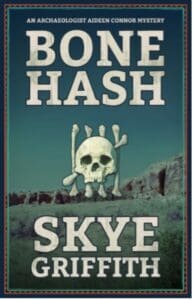
Bone Hash
(Archaeologist Aideen Connor Mysteries)
By Skye Griffith
Blurb
Ancient Bones. A modern murder. A deadly secret buried deep in the desert.
In the vast untamed desert of northern Arizona, Aideen Connor signs on as lead archaeologist hoping to find peace after witnessing her husband’s violent death. Instead, she stumbles into a mystery as ancient and dangerous as the land itself. Aideen’s team uncovers a “bone hash,” human bones showing evidence of prehistoric cannibalism. Then a brutal murder shocks the residents of the nearby Hopi Reservation. Unsettling connections emerge between the murder and her dig, and Aideen’s world begins to unravel.
Aideen’s boss blames her when the bone hash is stolen. Violent threats begin: A sheep is viciously killed under her residential trailer; a photo of her dead husband is left in its blood. A hulky stranger chases her across remote backcountry and attacks her. All threats point to a grim reality: someone wants her gone. Aideen must navigate a maze of buried truths with only her dog, Dakota for companionship. Every clue leads her closer to the secrets buried at her dig that could cost her more than her career—they could cost her life.
“Griffith has created a riveting work that successfully blends a chilling mystery and a revealing character study into a potent whole.” Kirkus Review
Buy Links:
Amazon: https://www.amazon.com/Bone-Archaeologist-Aideen-Connor-Mysteries/dp/1963832132
Barnes & Noble: https://www.barnesandnoble.com/w/bone-hash-skye-griffith/1146845598
West Side Shops: https://www.westsidebooks.com/book/9781963832136
Bookshop: https://bookshop.org/p/books/bone-hash-skye-griffith/22229980
AUTHOR BIO: SKYE GRIFFITH

Award-winning event producer and passionate explorer, Skye Griffith debuts her talent for storytelling with Bone Hash, a gripping mystery inspired by her explorations of archaeological sites and rugged backcountry across the American Southwest.
Skye’s fascination with prehistoric cultures and their ability to thrive in unforgiving landscapes sparked the heart of her story. Through years of research and first-hand adventures, she crafts an authentic and vivid narrative of secrets buried in desert sands.
Before turning to fiction, Skye orchestrated large-scale events—including Denver’s first world championship, the Stanley Cup celebration, and the Pope’s historic visit to Denver during World Youth Day. Her articles have appeared in the National Endowment for the Arts newsletter and other industry publications. She holds degrees from the Universities of Cincinnati and Denver and is a member of the Denver Woman’s Press Club, Mystery Writers of America, and Sisters in Crime. She lives in Denver with her husband and their 115 lb Malamute.
Author Links:
Website: https://skyegriffith.com/
LinkedIn: https://www.linkedin.com/in/skyegriffith/
Facebook: https://www.facebook.com/skye.griffith1
BookBub: https://www.bookbub.com/authors/skye-griffith
AUTHOR INTERVIEW: SKYE GRIFFITH

1. What inspired you to write Bone Hash?
After enjoying travels throughout the U. S., Europe and South America, I realized the high desert American Southwest is one of the places on earth I like visiting most. Ever since my first trip to Mesa Verde, an extensive archaeological site in southwestern Colorado, I’ve held a fascination for the people who once walked the Four Corners Region, the people whom we now identify as Ancestral Puebloan. Most archaeologists believe they are the ancestors of modern-day Pueblo people now living in New Mexico and Arizona.
These prehistoric Native Americans created hundreds of villages across Colorado, Utah, Arizona and New Mexico from the only building materials available—rocks and mud. At Mesa Verde in southwestern Colorado, I learned of their dry land farming on the mesa tops, their well-thought-out irrigation systems and how they’d managed to thrive in an environment both harsh and beautiful. Then between 1275 and 1300 CE, a thirty-to-fifty-year drought forced them to abandon everything and leave their homes. Some scientists also speculate about the impact of increased violence and cultural collapse brought on by the environmental devastation.
When I began to consider what challenges, a modern-day archaeologist might face while she examined the material culture of prehistoric people who’d left their homes behind—a devastating loss—while she came to grips with her own loss after witnessing the violent death of her husband, I knew I had to write this story, and one-by-one the characters in Bone Hash began to reveal themselves.
2. How much research was involved in writing Bone Hash?
I spent years researching Bone Hash! I visited archaeological sites including Bandelier, Hovenweep, Aztec, Canyon de Chelly and others and teaching sites such as Crow Canyon in southwestern Colorado. I interviewed archaeologists and read their research papers, hiked sites such as Canyon of the Ancients where Ancestral Puebloans once lived, visited modern day Pueblos, such as Taos Pueblo and villages on the Hopi Reservation and camped in many remote areas on the Colorado Plateau.
I interviewed sheriffs in multiple counties in Arizona. I interviewed Bureau of Land Management (BLM) special agents tasked with protecting ancient sites in the Southwest, F. B. I. agents and the list goes on!
3. Why did you choose to incorporate finding human bones (bone hash) that showed evidence of prehistoric cannibalism in the story?
From scientific papers I’ve read, cannibalism on the Colorado Plateau, during the drought especially, was somewhat common. It’s not something Native Americans like to discuss, most likely because the issue has been used negatively against them. Yet in prehistoric times, cannibalism was relatively common throughout the world, including among my Celtic ancestors. There are archaeological sites all over Europe, as an example, where prehistoric cannibalism was discovered. I believe it adds to the reader’s awareness as to how utterly desperate these prehistoric times were. And it adds to the considerations the modern archaeologist who is the main character in my book needs to consider–how to understand the ancient people she is studying without judging them.
4. Which sub-character is your favorite in Bone Hash? Explain why.
I’d have to confess it’s Dakota, Aideen’s dog! I think I’ve been a dog lover since birth, and I’ve known firsthand how loyal dogs are. It made sense to me there would be a strong bond between woman and dog given the remoteness of the dig and the fact Aideen rescued the dog and saved its life.
5. What is your favorite quote from Bone Hash?
It would have to be what Frank Nakai says at the end of the final chapter but stating it here would be too big of a spoiler!
6. What makes you keep going? What advice would you give to new writers?
I came to writing fiction later in life, fulfilling a life-long dream, and I’m so grateful I finally have the time to devote to it. More importantly, Bone Hash is the response to my travels throughout the Colorado Plateau and many wonderful adventures. Writing about them helps me enjoy those adventures all over again! Advice to new writers: Write what you love! The old adage is “write what you know.” Good advice, but it’s also possible to learn new things and do extensive research. I’d say go for that!
7. Which writer, living or dead, do you admire most?
Too hard to get it down to one person. The writing of Louis de Bernières in Corelli’s Mandolin is some of the most beautiful and poignant I’ve read.
I love the work of Tana French.
You must give credit to the brilliant storytelling of Charles Dicken.
James, by Percival Everett is a marvel.
There are so many writers’ whose works I love—all for different reasons—and often one book stands out more than their whole body of work.
BOOK REVIEW: BONE HASH
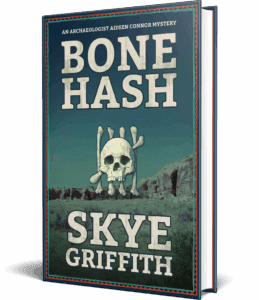
Archaeologist Aideen Connor, haunted by the tragic death of her husband, must find strength to overcome threats in her quest to uncover secrets from the ancient past in Bone Hash by Skye Griffith. The murder mystery/suspense captures the harsh, unforgiving beauty of the American Southwest as Aideen starts her life anew as the lead archaeologist at Moenkopi Ridge, an Ancestral Pueblo settlement.
However, Aideen awakes to danger when a stranger barges into her motel room seeking a photo of a native woman he left behind. She escapes his clutches and reports the incident to tribal policemen. When she drives to the archaeological dig, the stranger rams her mustang off the road.
Incidents at the archeological site becomes deadly when a bone hash showing signs of cannibalism from the past is uncovered by Aideen’s archaeological team but then is stolen. As Aideen faces other threats to her career and life, she struggles to connect the web of events: murder of a Hopi woman, deadly intruders at the dig, and illegal drugs hidden among stored artifacts. Ultimately, she must delve into her tragic past to save her career and her life in a riveting climax full of twists.
Author Skye Griffith masterfully weaves the Southwest landscape into the story to help create suspense. Creatures lurk everywhere in darkness, ready to strike like her adversaries. The meticulous details of various tribal enforcement agencies and archaeological digs add depth and reality to the story. The action scenes are heart-pounding, particularly the climax. The twists will keep you turning the pages to find out how the various incidents are connected.
The narrative is told from the first-person perspective of Aideen, a spunky and resilient woman who meets challenges head-on. Even so, she sometimes shows her vulnerability due to her husband’s untimely death that she was unable to prevent. She has formed a strong bond with her companion dog, Dallas, whom she rescued. Their interplay blends smoothly in the plotline and adds to poignant moments. The climax and ending resonate with me because Aideen uses the tragedy of her husband’s death to gain strength and overcome threats to her life and career, so she can move forward. The epilogue promises more stories about Aideen in the future.
Set in the Southwest, Bone Hash is a gripping, multi-layered mystery/suspense with a memorable archaeologist sleuth that fans of Tony and Anne Hillerman might enjoy. Highly recommended.
August 10, 2025
Sandro Martini Ciao, Amore, Ciao #CiaoAmoreCiao #HistoricalFiction #WWII #BlogTour #TheCoffeePotBookClub @MartiniAlex @cathiedunn
I’m delighted to welcome Sandro Martini as the featured author in The Coffee Pot Book Club Blog Tour being held between August 4th – 25th, 2025. Sandro Martini is the author of the Historical Fiction, Ciao, Amore, Ciao (Alex Lago Book #1), published by Black Rose Writing on March 26, 2025 [426 pages (kindle); 385 pages (paperback)].
Below are highlights of Ciao, Amore, Ciao, Sandro Martini’s author bio, and a guest post about the historical background of the novel.

Tour Schedule Page: https://thecoffeepotbookclub.blogspot.com/2025/07/blog-tour-ciao-amore-ciao-by-sandro-martini.html
HIGHLIGHTS: CIAO, AMORE, CIAO

Ciao, Amore, Ciao
(Alex Lago Book #1)
By Sandro Martini
Blurb:
An enthralling dual-timeline WWII family mystery, based on the heartbreaking true story of the massacre in a small town in Italy in July of 1945, from award-winning, bestselling novelist Sandro Martini.
“A gripping saga that roots excruciating betrayals in a nation’s tragic history.” –Kirkus Reviews
In the winter of 1942, an Italian army of young men vanishes in the icefields of the Eastern Front. In the summer of 1945, a massacre in Schio, northeastern Italy, where families grieve the dead, makes international headlines.
In present-day Veneto, an ordinary man is about to stumble onto a horrifying secret.
Alex Lago is a jaded journalist whose career is fading as fast as his marriage. When he discovers an aged World War II photo in his dying father’s home, and innocently posts it to a Facebook group, he gets an urgent message: Take it down. NOW.
Alex finds himself digging into a past that needs to stay hidden. What he’s about to uncover is a secret that can topple a political dynasty buried under seventy years of rubble. Suddenly entangled in a deadly legacy, he encounters the one person who can offer him redemption, for an unimaginable price.
Told from three alternating points of view, Martini’s World War II tale of intrigue, war, and heartbreak pulls the Iron Curtain back to reveal a country nursing its wounds after horrific defeat, an army of boys forever frozen at the gates of Stalingrad, British spies scheming to reshape Italy’s future, and the stinging unsolved murder of a partisan hero.
Ciao, Amore, Ciao is a gripping story of the most heroic, untold battle of the Second World War, and a brilliantly woven novel that brings the deceits of the past and the reckoning of the present together.
“Balances action, suspense, and emotional depth to deliver a truly immersive, thought-provoking read with an unflinching look at the sins of the past and the lengths to which the powerful will go to keep them buried.” ~ Sublime Book Review
Any Triggers: War
Buy Link:
Universal Buy Link: https://books2read.com/u/4A6R10
This title is available to read on #KindleUnlimited.
AUTHOR BIO: SANDRO MARTINI

Sandro Martini has worked as a word monkey on three continents. He’s the author of Tracks: Racing the Sun, an award-winning historical novel.
Sandro grew up in Africa to immigrant parents, studied law in Italy, chased literary dreams in London, hustled American dollars in New York City, and is now hiding out in Switzerland, where he moonlights as a Comms guy and tries hard not to speak German.
You can find him either uber-driving his daughter, chasing faster cars on the autobahn, or swimming in Lake Zurich with a cockapoo named Tintin.
His latest historical suspense novel, Ciao, Amore, Ciao, is now available.
Author Links:
Website Twitter / X Facebook Instagram
Book Bub Amazon Author Page Goodreads
GUEST POST: SANDRO MARTINI

Most English-language accounts of Italy in the Second World War stop at Mussolini’s surrender and switch of sides, yet the deeper story— the landscape of my novel Ciao, Amore, Ciao—has rarely been told. Fascism’s roots stretch beyond Rome to post-1918 disillusion: London’s secret promise of Dalmatia to Italy; Italy’s betrayal at Versailles, branded by poet-soldier Gabriele D’Annunzio as the “mutilated victory”; and D’Annunzio’s seizure of Fiume, where fascist symbols, chants, and salutes were first codified.
Paradoxically, fascism’s demise didn’t happen in September 1943 when the Allies made landfall in Sicily. It began nine months earlier, on the Don River, during the Battle of Stalingrad. Mussolini, hoping to share the Baku oilfields with his Nazi chums, had sent more than 250,000 Italians east in 1942, my uncle included. Quickly reassigned to shield the German Sixth Army’s exposed flank as the might of the Nazi war machine stalled at the gates of Stalingrad, Italy’s army met the full force of the Soviet winter counter-offensive. On 26 December 1942, the Red Army smashed through the Italian lines, trapping Italians and Germans alike in what survivors still call “the sack” that doomed both the Sixth Army in Stalingrad and, ultimately, the Axis war itself. In less than a month, the course of the war had changed irreversibly.
What followed the Red Army’s offensive was a 14-day nightmare march for the Italian army. In a frozen landscape where the temperature never rose above -30°C, the Alpine Corps fought a dozen rearguard battles while walking some 250 km toward a new, shaky Axis front. Their final obstacle was the railway hamlet of Nikolayevka, reached on 26 January 1943 and remembered as Italy’s Thermopylae: those who burst through lived; those who did not vanished into the snow. It ended with the last-ever human wave attack in recorded warfare.
The numbers are staggering. Of roughly 230,000 Italian soldiers on the Don, only about 140,000 ever saw home again. Roughly 85,000 died in battle, on the frozen retreat, or in Soviet camps. Of the 60,000 taken prisoner and force-marched to POW camps (the way of the davai), scarcely one in six returned between 1945 and 1954. Among the disappeared was my 19-year-old uncle, Alessandro, whose fate my anti-hero, Alex Lago, strives to uncover in Ciao, Amore, Ciao. Soviet archives opened after 1991 solved thousands of family mysteries, yet his name never surfaced; dog tags still emerge from the same steppe which is today scarred by a new war between Russia and Ukraine. But of my uncle Alessandro’s fate, nothing.
Those who limped back in 1943 were met not with parades but with silence and shame. Fascist propaganda could not admit the annihilation of its elite troops, and within months, many survivors were in the hills with the Russian-armed partisans, battling first the fascists and then, when Italy surrendered in 1943, the Germans who had raced south to occupy their former ally.
Liberation in 1945 ushered in the horror of the “resa dei conti”—the settling of scores. In the Po Valley’s “Triangle of Death”, thousands of fascist collaborators were summarily executed and buried in mass graves, a grisly mirror of the squadristi terror campaigns of the 1920s.
One episode, the July 1945 massacre in Schio in the Veneto, drew the scrutiny of the New York Times and of Allied investigators. With Italy’s Communist Party poised to dominate post-war elections, and Washington and London fearful that an Italian swing to the left might pull France, and perhaps all of Western Europe, behind the Iron Curtain, it suddenly became politically expedient to pin the post-war massacres on Communist partisans. And Schio was their mascot because it was one of only two towns that were liberated not by the Allies but by the partisans themselves. The message the Allies wanted to give was, “Look at what happens when the Communists take over.”
Come 1948 and the first post-war elections, the newly minted CIA would use that massacre in Schio as part of its propaganda campaign to buy its first client state: They’d funnel millions from the Marshall Plan to spread propaganda linking the Italian Communist Party to the post-war massacres in 1945, accuse the communists of wilfully colluding with the Soviets to keep Italian POWs in the USSR, and provide literal “bags of cash” to US-friendly politicians. It worked, and that Italian election became the blueprint for the CIA’s covert proxy wars for decades after.
It’s a rich tapestry for a novel. But the personal is where Ciao, Amore, Ciao is grounded: In my uncle’s fate in Russia, and my dad, who saw the massacre in Schio as a 15-year-old boy. And the scars that would haunt him his whole life. It’s the story of the “little” people trapped in these cold machinations of the powerful, a story of a family of no ones swept away by history, fate, and the limitless supply of human folly.
 Twitter: @cathiedunn
Twitter: @cathiedunn
Instagram & Threads: @thecoffeepotbookclub
Bluesky: @cathiedunn.bsky.social
August 6, 2025
Jiu Da The Winding Dirt Road #TheWindingDirtRoad #HistoricalChineseFiction #PoliticalFiction #HistoricalFiction #BlogTour #TheCoffeePotBookClub @JiudaLog @cathiedunn
I’m delighted to welcome Jiu Da as the featured author in The Coffee Pot Book Club Blog Tour being held between August 4th – 8th, 2025. Jiu Da is the author of the Historical Fiction, The Winding Dirt Road, published by Historium Press on May 27, 2025 (268 pages).
Below are highlights of The Winding Dirt Road, Jiu Da’s author bio, and a snippet from the book.

Tour Schedule Page: https://thecoffeepotbookclub.blogspot.com/2025/07/blog-tour-the-winding-dirt-road-by-jiu-da.html
HIGHLIGHTS: THE WINDING DIRT ROAD
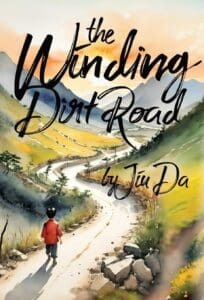
The Winding Dirt Road
By
Jiu Da
Blurb:
Written as an antithesis to all first-hand and second-hand propaganda written by both Chinese and foreign writers for China in the good part of the 20th century in a fictional form, this collection, through different times and lands, gives insights into how human docile nature and characteristics are manipulated and brought about cultural and social corrosion over the century. The outcome thus sees “a monumental loss breathtakingly massive than any period that preceded it.” Subsequently, it foreshadows a system that “would bring out not the best but the worst in people, against people, any people.” (Event Horizon)
The first story is written as an introduction in addition to the prologue. From there, the collection proceeds with interrelated subjects or topics, building up causes and factors. At every turn, it gathers momentum and convenes halfway through the book to form the major components of critical perspectives at a juncture.
Hoarded in the depth of memories of the past decades, this has been a work long overdue.
Buy Link:
Universal Buy Link: https://geni.us/VwB3xZ
AUTHOR BIO: JIU DA

For years, Jiu Da has been intrigued by the question of whether the environment makes us who we are or whether we are the ones that shape our environment. For the good parts of early years, he stubbornly believed that motivation, talent, and effort could change the outcomes. It did not.
It was not until the virus hit while finding himself perching at home that he came to accept that the environment is indeed the hand that shapes human behavior.
It was during this time that he began his first work, drawing from his love in literature, history and a lifetime of seemingly useless yet fascinating knowledge hoarded in the depth of his mind.
Author Links:
Author Page on Publisher’s Website: https://www.historiumpress.com/jiu-da
Twitter / X: https://x.com/JiudaLog
Instagram: https://www.instagram.com/jiuda99/
Bluesky: https://bsky.app/profile/jiuda.bsky.social
Amazon Author Page: https://www.amazon.com/stores/Jiu-Da/author/B0F63SL22K
Goodreads: https://www.goodreads.com/author/show/55530207.Jiu_Da
SNIPPET: THE WINDING DIRT ROAD

“Even though chance favored the prepared mind, discovering the plant was hardly a serendipity. In truth, it was a curse in disguise – a precipice gamble for a desperate cure, a lethal quest for a mortal end, poison for poison.” ~ The Mother Of All Antidotes
 Twitter: @cathiedunn
Twitter: @cathiedunn
Instagram & Threads: @thecoffeepotbookclub
Bluesky: @cathiedunn.bsky.social



